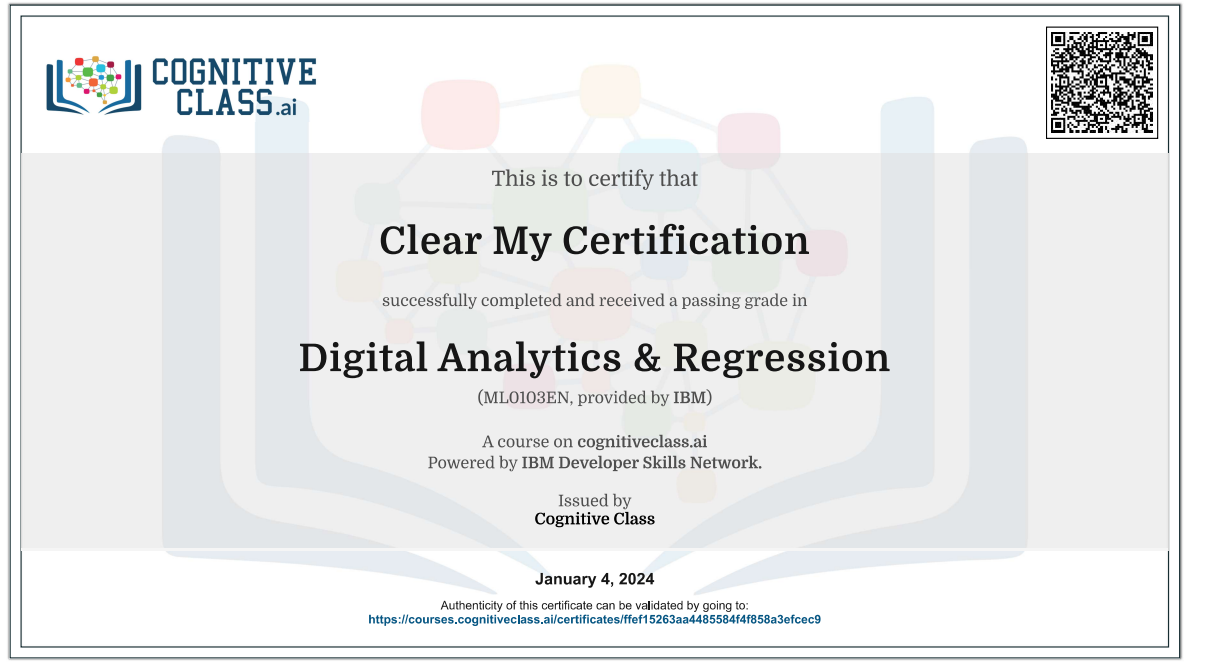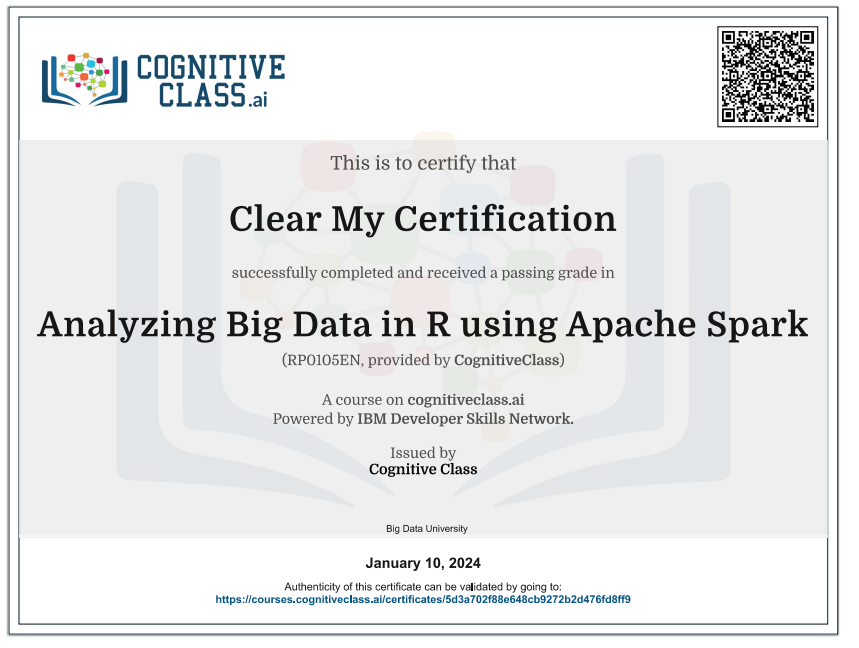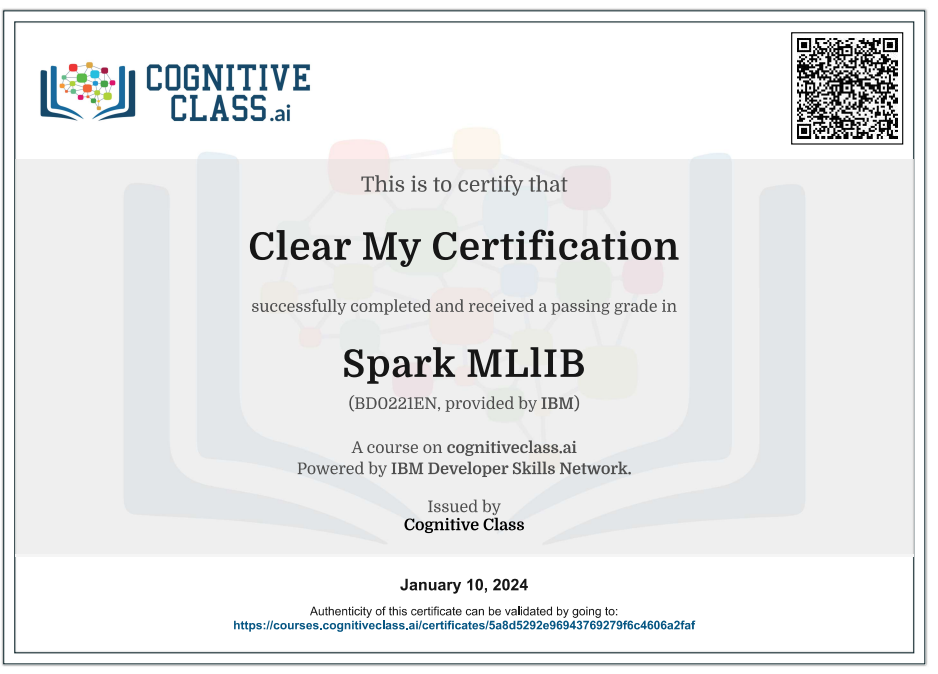Enroll Here: Digital Analytics & Regression Cognitive Class Exam Quiz Answers
Digital Analytics & Regression Cognitive Class Certification Answers

Module 1: Case Study ‘CEO vs. CMO’ Quiz Answers – Cognitive Class
Question 1: You are a newly-hired analyst at a small tech startup in a big metropolitan city. In your first team meeting, and one week before the scheduled product launch, the Chief Executive Officer (CEO) and the Chief Marketing Officer (CMO) have a heated argument about what to call the product.
The CEO has done a quick search on Google Trends and found that ‘Analytics’ is, by far, a more popular search term than ‘Data Science’ or ‘Data Scientist’. The CMO, who has some experience in SEM from his work at another tech company, has a gut feeling that ‘Data Scientist Workbench’ will bring the right target group to the new product. The two executives ask you to weigh in.
Based on the Case Study you have read, which of the following is the most suitable data set to start an analysis to help the executives decide which term to include in the product name?
- Existing Company Adwords Data
- Open Data
- Search Engine Trends Data
- Survey Data
Question 2: Based on the Case Study you have read, how many domains available for purchase?
- 1
- 2
- 3
- 4
Question 3: Based on the Case Study you have read, what was the ‘Expert Tip’?
- Don’t offer your opinion to senior executives if you are new to a company.
- Your first assumption is always the correct one.
- If it can’t be measured, it doesn’t exist.
- When solving business problems with data, be curious.
Module 2: Importing Google Trends data in R Quiz Answers – Cognitive Class
Question 1: How many rows does the function head(dataset) return?
Enter your answer below: 6
Question 2: What does head(case_table$WeekID) do?
Enter your answer below:
- returns the first six rows of case_table and all of its columns
- returns all the data in case_table
- returns the first six items of the WeekID column in case_table
- returns the entire WeekID column of data in case_table
Question 3: TRUE or FALSE? The function str() can be used to tell you the number of rows and columns in a dataframe, and some other characteristics of the data.
- True
- False
Module 3: Plotting & Correlation Quiz Answers – Cognitive Class
Question 1: Which search term has the most number of searches?
- Machine Learning
- Data Scientist
- Analytics
- Data Science
- Regression
Question 2: A correlation score of 0.9 between variables X and Y indicate which of the following?
- As X increases, Y decreases.
- There is a weak positive correlation between X and Y.
- X and Y are opposites of each other.
- A strong positive correlation.
- X causes Y.
Question 3: In the R script file, which command can you use to plot line graphs?
- makePlot( )
- createGraph( )
- plot( )
- linegraph( )
- graph( )
Module 4: Simple Linear Regression in R Quiz Answers – Cognitive Class
Question 1: What is the correlation between searches for ‘data science’ and ‘data scientist’? Give the numeric answer to two decimal places.
Question 2: Running a linear model in R for a dataset results in the formula: Y = 5.0 + 3.0X. Which of the following is true?
- Y will always be positive.
- X is 3 times as large as Y.
- There is a negative correlation between X and Y.
- As X increases, Y decreases.
- When X is equal to 5, the model predicts that Y will equal 20.
Question 3: In R, what symbol or character do we use to specify a column in a table?
- ?
- ==
- /
- $
Digital Analytics & Regression Final Exam Answers – Cognitive Class
Question 1: What is the correlation (as a %) between the two search terms in the exam data set? For example, if the correlation is 0.5, enter 50 below.
Question 2: What is the mean of the values for Hadoop searches? Your answer should include two decimal places (for example, 10.01).
Question 3: What is the R Squared for the Regression model in the exam data set? The answer format must be a percentage with no decimal places. For example, if the R^2 value is 0.5, then you should write 50 below.
Question 4: What weeks correspond to WeekID 16?
- 2004-06-06 – 2004-06-12
- 2004-01-25 – 2004-01-31
- 2004-04-18 – 2004-04-24
- 2004-08-15 – 2004-08-21
Question 5: Which R function creates a linear model?
- lm ( )
- abline ( )
- regression ( )
- summary ( )
Question 6: Determine the formula for your linear model. Using the linear model you have just created to predict search index values: if the search index for ‘Hadoop’ is 35, what is the predicted corresponding search index for ‘Big Data’ according to your model?
- 88
- 19
- 45
- 30
Question 7: Generally speaking, the simple linear model created from these two search terms fits the data well, TRUE/FALSE?
- TRUE
- FALSE
Question 8: In the Linear Model, ‘Hadoop’ is the Y variable, TRUE/FALSE?
- TRUE
- FALSE
Question 9: Having now gone through the exercises in this course, and going back to the debate between the CEO vs. CMO, what product name was chosen as the most suitable for the target audience?
- Analytics Workbench
- Data Scientist Workbench
Introduction to Digital Analytics & Regression
Digital analytics involves the collection, measurement, analysis, and interpretation of digital data from various online channels and platforms. Regression analysis is a statistical technique that can be applied to digital analytics to understand the relationships between different variables and make predictions. Here’s how regression analysis can be used in the context of digital analytics:
- Understanding User Behavior:
- Regression analysis can help analyze the relationship between various digital marketing efforts (e.g., ad spend, social media engagement) and user behavior metrics (e.g., website visits, conversion rates).
- By identifying significant variables, marketers can allocate resources more effectively and optimize their strategies.
- Conversion Rate Optimization:
- Regression analysis can be used to identify factors that influence the conversion rate on a website or in an app.
- Variables such as page load times, user demographics, or the effectiveness of different marketing channels can be analyzed to optimize the user experience and increase conversion rates.
- Attribution Modeling:
- Digital analytics often involves attributing conversions or user actions to specific touchpoints in a user’s journey.
- Regression analysis can help understand the contribution of different marketing channels or campaigns to conversions, allowing for more informed decision-making in attribution modeling.
- Predictive Analytics:
- Regression analysis can be applied to predict future user behavior based on historical data.
- For example, predicting website traffic, sales, or user engagement can be valuable for planning marketing strategies and resource allocation.
- A/B Testing Analysis:
- A/B testing is a common practice in digital analytics to compare two versions of a webpage, app, or marketing campaign.
- Regression analysis can help analyze the impact of changes and identify statistically significant differences in performance between the A and B groups.
- Customer Lifetime Value (CLV) Prediction:
- Regression models can be used to predict the potential lifetime value of a customer based on various factors such as their purchase history, engagement patterns, and demographics.
- This information is valuable for customer segmentation and personalized marketing strategies.
- Identifying Key Performance Indicators (KPIs):
- Regression analysis can help identify which variables have the most significant impact on specific key performance indicators.
- Understanding the key drivers of success allows businesses to focus on optimizing those factors.
- Social Media Analytics:
- Regression analysis can be applied to social media data to understand the correlation between social media engagement metrics (likes, shares, comments) and other business metrics (sales, website visits).
It’s important to note that regression analysis should be conducted carefully, considering factors such as data quality, the assumptions of the regression model, and the potential presence of confounding variables. Additionally, collaboration between data analysts, digital marketers, and domain experts is crucial for effective interpretation and application of regression analysis results in the context of digital analytics.
 Clear My Certification All Certification Exam Answers
Clear My Certification All Certification Exam Answers



